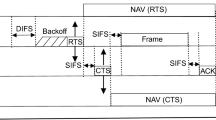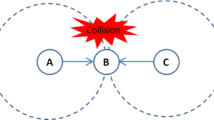Abstract
We focus on energy saving in 802.11-based WLANs. Previous work has shown that, on the one hand, 802.11 wireless interfaces consume a significant amount of energy, on the other hand the use of current power management schemes can severely degrade the QoS performance of several Internet-based applications. Furthermore, the energy spent by wireless devices may even increase when the standard 802.11 power-saving mode (PSM) is implemented. These facts suggest that other solutions to energy saving are highly needed.
In this paper, we consider the 802.11 distributed access scheme and we propose a novel approach that enables a station to enter a low-power operational state during channel contention. More specifically, our technique exploits the virtual carrier sense mechanism and the backoff function specified in the IEEE 802.11 DCF, so that a station can dramatically reduce its energy consumption without significant degradation of the QoS performance. To efficiently implement our mechanism, a low-power state with negligible transition time into the active state must be identified. This can be any of the non-standard, low-power states defined by proprietary solutions in the current or next-generation products [7,15,22]. By using the network simulator ns2, we evaluate the performance improvement that is obtained when the proposed mechanism is implemented, against the results attained through the standard DCF. The results show that we can achieve a reduction in energy consumption as large as 80% and 28% under, respectively, UDP and TCP traffic.
Similar content being viewed by others
References
M. Anand, E.B. Nightingale and J. Finn, Self-tuning wireless network power management, ACM/IEEE MobiCom 2003, San Diego, CA (Sep. 2003) pp. 176–189.
G. Anastasi, M. Conti, E. Gregori and A. Passarella, Saving Energy in Wi-Fi Hotspots through 802.11 PSM: An Analytical Model, 2nd Workshop on Modeling and Optimization in Mobile, Ad Hoc and Wireless Networks (WiOpt’04), Cambridge UK (March 2004) pp. 227–236.
L. Bononi, M. Conti and L. Donatiello, A distributed mechanism for power saving in IEEE 802.11 wireless LANs, ACM/Baltzer Mobile Networks and Applications (MONET) 6(3) (2001) 211–22.
R. Bruno, M. Conti and E. Gregori Optimization of efficiency and energy consumption in p-persistent CSMA-based wireless LANs, IEEE Transactions on Mobile Computing 1(1) (2002) 10–31.
C.-F. Chiasserini and M. Meo, A Reconfigurable Protocol Setting to Improve TCP over Wireless, IEEE Transactions on Vehicular Technology 51(6) (2002) 1608–20.
J.-M. Choi, Y.-B. Ko and J.-H. Kim, Enhanced power saving scheme for IEEE 802.11 DCF based wireless networks, in: International Conference on Personal Wireless Communication (PWC ’03), Venice, Italy (Sep. 2003) pp. 835–840.
Conexant System Inc., PRISM GT WLAN Card, http://www.80211bnews.com/publications/page207-624092.asp#
J.G. Dorsey and D. P. Siewiorek, Online power monitoring for wearable Systems, in: 6th International Symposium on Wearable Computers, Seattle, WA (2002) pp. 137–138.
J.-P. Ebert, B. Burns and A. Wolisz, A trace-based approach determining the energy consumption of a WLAN network Interface, in: European Wireless 2002 (Feb. 2002) pp. 230–236.
L.M. Feeney and M. Nilsson, Investigating the energy consumption of a wireless network interface in an ad hoc networking environment, IEEE INFOCOM 2001, Anchorage, AK (April 2001) pp. 1548–57.
A. Grilo and M. Nunes, Performance evaluation of IEEE 802.11e, in: IEEE PIMRC’02, Lisboa, Portugal (Sep. 2002) pp. 511–17.
C.-S. Hsu, J.-P. Sheu and Y.-C. Tseng, Minimize waiting time and conserve energy by scheduling transmissions in IEEE 802.11-based ad hoc networks, International Conference on Telecommunications (ICT) 2003, Papete, French Polynesia (Feb 2003) pp. 393–399.
IEEE 802.11 WG, Part 11: Wireless LAN Medium Access Control (MAC) and Physical Layer (PHY) Specifications, 1999.
IEEE 802.11 WG, Draft Supplement to Standard for Telecommunications and Information Exchange Between Systems-LAN/MAN Specific Requirements—Part 11: Wireless Medium Access Control (MAC) and physical layer (PHY) specifications: Medium Access Control (MAC) Enhancements for Quality of Service (QoS), IEEE 802.11e/Draft 5.0, July 2003.
Intel Inc., Intel PRO Wireless 220 (802.11b/g) Card, Technical Specifications, http://www.dell.com/downloads/us/products/latit/intel2200_spec.pdf
R. Jain et al., A quantitative measure of fairness and discrimination for resource allocation in shared computer systems, DEC RR TR-301 (Sep. 1984).
E.-S. Jung and N.H. Vaidya, An energy efficient MAC protocol for wireless LANs, in: IEEE INFOCOM 2002, New York, NY (June 2002) pp. 1756–1764.
A. Kamerman and L. Monteban, WaveLAN-II: A high performance wireless LAN for the unlicensed band, Bell Labs Technical Journal 2(3) 1997.
R. Krashinsky and H. Balakrishnan, Minimizing Energy for Wireless Web Access with Bounded Slow-down, in: ACM/IEEE MobiCom 2002, Atlanta, GA (Sep. 2002) pp. 119–130.
J. Lee, C. Rosenberg and E.K.P. Chong, Energy Efficient Scheduler Design in Wireless Networks, in: 2nd Workshop on Modeling and Optimization in Mobile, Ad Hoc and Wireless Networks (WiOpt’04), Cambridge, UK (Mar. 2004) pp. 237–246.
S. Singh and C. S. Raghavendra, PAMAS—Power Aware Multi-Access protocol with Signaling for Ad Hoc Networks, ACM Computer Communication Review 28(3) (1998) 5–26.
Socket Communications, CF Wireless LAN Card, Technical Specifications, http://www.socketcom.com/product/WL6004-322.asp
tstat - http://tstat.tlc.polito.it/
UCB/LBNL/VINT, Network Simulator—ns—version 2.26, http://www.isi.edu/nsnam/ns, 2002.
S. Yan, Y. Zhuo and S. Wu, An adaptive RTS threshold adjust algorithm based on minimum energy consumption in IEEE 802.11 DCF, ICCT 2003, Beijing, China (April 2003) pp. 1210–14.
Author information
Authors and Affiliations
Corresponding author
Additional information
This work was supported by the Italian Ministry of University and Research through the PATTERN and the PRIMO projects.
Valeria Baiamonte graduated from Politecnico di Torino with a degree in Telecommunications Engineering in 2002, with 110/110. Between March 2002 and November 2002, she was supported by TiLab (Italian Public Telephone Research Company) while developing her thesis work on packet scheduling algorithms for WCDMA systems networks. From January 2003 to December 2003, she was a CNIT researcher at the Electronics Department of Politecnico working on the VICOM project. Currently she is a PhD student at the Electronics Department of Politecnico di Torino.
Carla-Fabiana Chiasserini graduated with a summa cum laude degree in Electrical Engineering from the University of Florence in 1996. She did her graduate work at the Politecnico di Torino, Italy, receiving the Ph.D. degree in 1999. Since then she has been with the department of Electrical Engineering at Politecnico di Torino, where she is currently an assistant professor. Since 1999, she has worked as a visiting researcher at the University of California, San Diego, California. Her research interests include architectures, protocols and performance analysis of wireless networks for integrated multi-media services. She is a member of the editorial board of the Ad Hoc Networks Journal (Elsevier), and has served as an associate editor of the IEEE Communications Letters since 2004.
Rights and permissions
About this article
Cite this article
Baiamonte, V., Chiasserini, CF. Saving Energy during Channel Contention in 802.11 WLANs. Mobile Netw Appl 11, 287–296 (2006). https://doi.org/10.1007/s11036-006-4480-x
Published:
Issue Date:
DOI: https://doi.org/10.1007/s11036-006-4480-x




